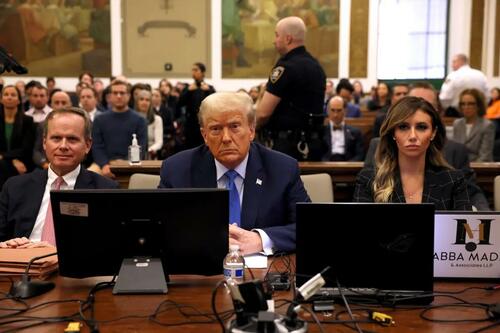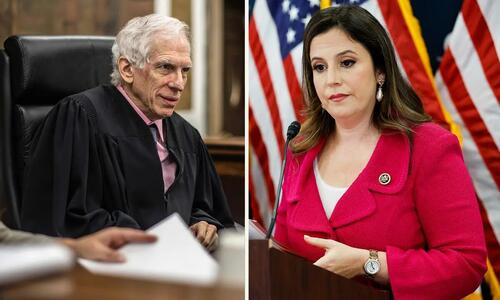
Authored by Michael Washburn via The Epoch Times (emphasis ours),
The media and public should brace themselves for the most heated phase of the civil fraud trial of former President Donald Trump when courtroom proceedings resume on Monday—if past interactions between the defense and the judge and government lawyers are any indication.

On Nov. 13, the defense will begin to make its case on behalf of the 45th president and 2024 candidate, as well as his two sons and daughter, who are no longer defendants in the case yet faced relentless and acrimonious cross-examination on the witness stand over the last two weeks.
President Trump's eldest son Donald Trump Jr. is expected to be the first to testify for the defense.
Trump lawyer Christopher Kise and Judge Arthur Engoron feuded throughout the cross-examination of President Trump, Donald Trump Jr., Eric Trump, and Ivanka Trump. The defense attorney has objected constantly that questions posed were irrelevant to the legal issues at hand or that no one could reasonably expect the people on the stand to recall the details of documents, records, meetings, and conversations from as far back as 2012.
As if to add further contentiousness to the proceedings, New York Attorney General Letitia James’s office on Friday sent a letter to Judge Engoron seeking to block testimony from four expert witnesses set to take the stand during the defense phase next week. Their testimony would address the accuracy of valuations contained in statements of financial condition submitted to Deutsche Bank and other firms for the purpose of securing favorable terms for loans and insurance. In the view of the attorney general’s office, such testimony is beside the point given that the judge has already ruled that Trump is guilty of fraud.
Nor has the pro-Trump side been inactive during the run-up to the next phase of the trial. On Friday, Rep. Elise Stefanik (R-N.Y.) sent a lengthy letter to the New York State Commission on Judicial Conduct, spelling out a litany of complaints about how Judge Engoron has conducted himself and his alleged bias against the respondents in the lawsuit.

“This judge’s bizarre behavior has no place in our judicial system, where Judge Engoron is not honoring the defendant’s rights to due process and a fair trial. These serious concerns are exacerbated by the fact that the defendant is the leading candidate for President of the United States, and it appears the judicial system is being politicized to affect the outcome of the campaign,” Ms. Stefanik writes.
She then goes on to cite the judge’s reference to the former president as “just a bad guy” deserving of prosecution by the attorney general, and his blunt statement to President Trump that "we are not here to listen to what you have to say.”
Judge Engoron also told President Trump's attorney Mr. Kise, “I am not here to hear what he has to say, now sit down!” and said, when Mr. Kise floated the idea of requesting a directed verdict, “You better not, Chris.”
The letter also characterizes the judge and members of his staff as “partisan Democrat donors” who, in violation of the New York Code of Judicial Conduct, have given lavishly to the party opposing President Trump.
Mr. Stefanik’s letter concludes, “Judge Engoron’s lawlessness sends an ominous and illegal warning to New York business owners: If New York judges don’t like your politics, they will destroy your business, the livelihood of your employees, and you personally. This Commission cannot let this continue.”
A Defense Lawyer's Concerns
Though Ms. Stefanik is not part of the Trump defense team in the current proceedings, her letter summarizes many of the objections that Mr. Kise has repeatedly raised over the last few weeks. Mr. Kise took exception to the frequent passing of notes between the judge and a law clerk, suggesting that the judge often made rulings favoring the plaintiffs upon reading the notes, whose contents were not disclosed to the rest of the court.
“The rulings are frequently if not inordinately against us on every issue,” said Mr. Kise. Later on in the proceedings, he said he hoped that the defense would receive the same latitude that the judge has granted to the plaintiffs when the defense finally gets its turn the week of Nov. 13.
Judge Engoron insisted that he had every right to send and receive as many notes as he pleased, and the validity of such courtroom procedure was not for Mr. Kise to adjudicate. At another point in the proceedings, the judge fired back at Mr. Kise, saying he vehemently objected to the suggestion that the judge held a bias in favor of the plaintiffs and was not acting in accordance with generally accepted rules and standards of courtroom conduct and decorum.
Near the end of the Nov. 2 hearing, Assistant Attorney General Andrew Amer ridiculed the idea that bias was at work and the grounds on which Mr. Kise alleged such bias.
“The notion that bias can be inferred by the number of notes passed between a judge and a clerk is one I have never heard of, and is frivolous,” Mr. Amer said.
Regardless of whether the concerns of Mr. Kise and Ms. Stefanik have any basis, the proceedings that get underway in Manhattan civil court at 10:00 a.m. on Monday are likely to rise—or descend—to a level of acrimony with few parallels in any lawsuit involving a former U.S. head of state or current presidential aspirant.
Authored by Michael Washburn via The Epoch Times (emphasis ours),
The media and public should brace themselves for the most heated phase of the civil fraud trial of former President Donald Trump when courtroom proceedings resume on Monday—if past interactions between the defense and the judge and government lawyers are any indication.

On Nov. 13, the defense will begin to make its case on behalf of the 45th president and 2024 candidate, as well as his two sons and daughter, who are no longer defendants in the case yet faced relentless and acrimonious cross-examination on the witness stand over the last two weeks.
President Trump’s eldest son Donald Trump Jr. is expected to be the first to testify for the defense.
Trump lawyer Christopher Kise and Judge Arthur Engoron feuded throughout the cross-examination of President Trump, Donald Trump Jr., Eric Trump, and Ivanka Trump. The defense attorney has objected constantly that questions posed were irrelevant to the legal issues at hand or that no one could reasonably expect the people on the stand to recall the details of documents, records, meetings, and conversations from as far back as 2012.
As if to add further contentiousness to the proceedings, New York Attorney General Letitia James’s office on Friday sent a letter to Judge Engoron seeking to block testimony from four expert witnesses set to take the stand during the defense phase next week. Their testimony would address the accuracy of valuations contained in statements of financial condition submitted to Deutsche Bank and other firms for the purpose of securing favorable terms for loans and insurance. In the view of the attorney general’s office, such testimony is beside the point given that the judge has already ruled that Trump is guilty of fraud.
Nor has the pro-Trump side been inactive during the run-up to the next phase of the trial. On Friday, Rep. Elise Stefanik (R-N.Y.) sent a lengthy letter to the New York State Commission on Judicial Conduct, spelling out a litany of complaints about how Judge Engoron has conducted himself and his alleged bias against the respondents in the lawsuit.

“This judge’s bizarre behavior has no place in our judicial system, where Judge Engoron is not honoring the defendant’s rights to due process and a fair trial. These serious concerns are exacerbated by the fact that the defendant is the leading candidate for President of the United States, and it appears the judicial system is being politicized to affect the outcome of the campaign,” Ms. Stefanik writes.
She then goes on to cite the judge’s reference to the former president as “just a bad guy” deserving of prosecution by the attorney general, and his blunt statement to President Trump that “we are not here to listen to what you have to say.”
Judge Engoron also told President Trump’s attorney Mr. Kise, “I am not here to hear what he has to say, now sit down!” and said, when Mr. Kise floated the idea of requesting a directed verdict, “You better not, Chris.”
The letter also characterizes the judge and members of his staff as “partisan Democrat donors” who, in violation of the New York Code of Judicial Conduct, have given lavishly to the party opposing President Trump.
Mr. Stefanik’s letter concludes, “Judge Engoron’s lawlessness sends an ominous and illegal warning to New York business owners: If New York judges don’t like your politics, they will destroy your business, the livelihood of your employees, and you personally. This Commission cannot let this continue.”
A Defense Lawyer’s Concerns
Though Ms. Stefanik is not part of the Trump defense team in the current proceedings, her letter summarizes many of the objections that Mr. Kise has repeatedly raised over the last few weeks. Mr. Kise took exception to the frequent passing of notes between the judge and a law clerk, suggesting that the judge often made rulings favoring the plaintiffs upon reading the notes, whose contents were not disclosed to the rest of the court.
“The rulings are frequently if not inordinately against us on every issue,” said Mr. Kise. Later on in the proceedings, he said he hoped that the defense would receive the same latitude that the judge has granted to the plaintiffs when the defense finally gets its turn the week of Nov. 13.
Judge Engoron insisted that he had every right to send and receive as many notes as he pleased, and the validity of such courtroom procedure was not for Mr. Kise to adjudicate. At another point in the proceedings, the judge fired back at Mr. Kise, saying he vehemently objected to the suggestion that the judge held a bias in favor of the plaintiffs and was not acting in accordance with generally accepted rules and standards of courtroom conduct and decorum.
Near the end of the Nov. 2 hearing, Assistant Attorney General Andrew Amer ridiculed the idea that bias was at work and the grounds on which Mr. Kise alleged such bias.
“The notion that bias can be inferred by the number of notes passed between a judge and a clerk is one I have never heard of, and is frivolous,” Mr. Amer said.
Regardless of whether the concerns of Mr. Kise and Ms. Stefanik have any basis, the proceedings that get underway in Manhattan civil court at 10:00 a.m. on Monday are likely to rise—or descend—to a level of acrimony with few parallels in any lawsuit involving a former U.S. head of state or current presidential aspirant.
Loading…




